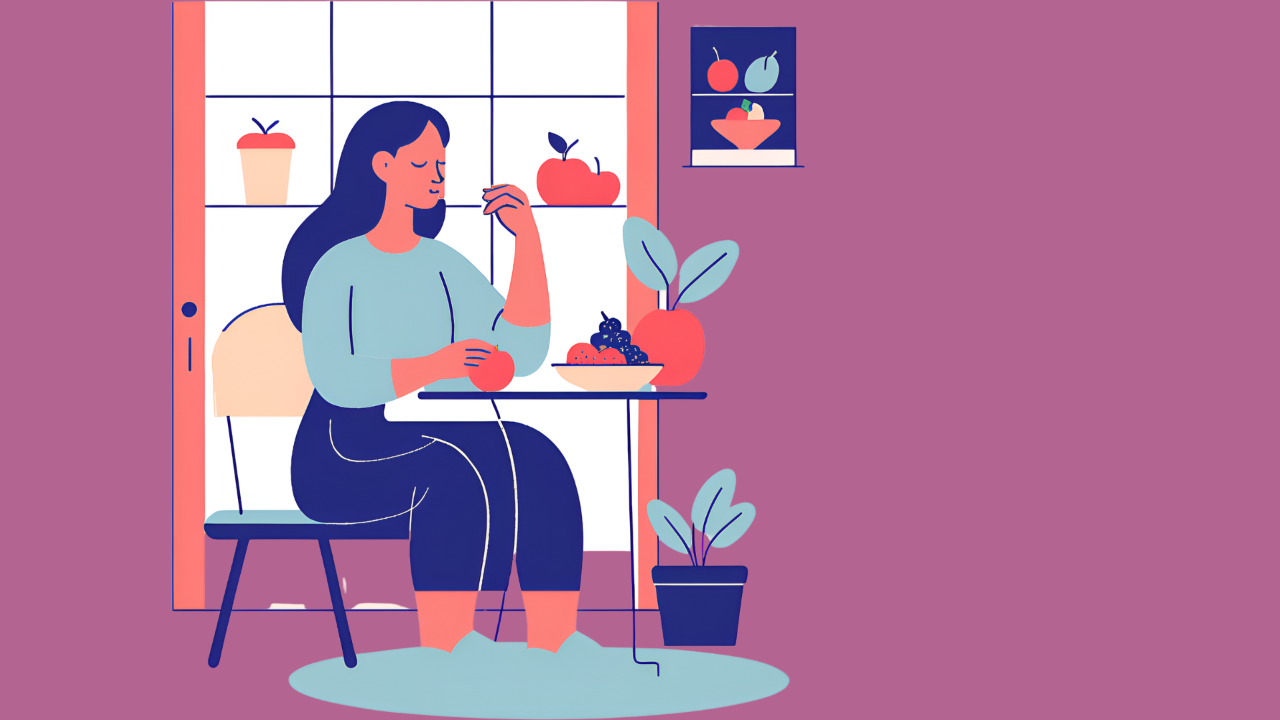4 signs you have an unhealthy relationship with food

And how to find long lasting food freedom
As a dietitian I’ve seen first hand how most people know what to do when it comes to nutrition, but when it comes to how to eat, they feel stuck.
- They crave the foods they know to be unhealthy
- They struggle to stick to the portion sizes they know to be right
- They struggle to separate food from their emotional and social needs
But struggling to follow these food rules is not the real problem. An unhealthy relationship with food is the problem.
All the rules and advice you are trying to follow, is not meant for you.
Let’s imagine for a moment, I gave you a pee schedule. I told you at what times and in what volumes you are allowed to pee. And if you needed to pee outside of that time or a greater amount, I criticised your bladder for being wrong.
I bet that sounds ridiculous?
Now imagine I gave you a meal plan (I’m a dietitian after all and know lots about food and nutrition). I tell you at what time and in what quantity to eat a variety of foods. And if you feel hungry outside of that plan, I criticise you for being wrong.
Sound familiar?
Food is a basic need.
Your body knows when and how much it needs to eat. And just like we will all pee different amounts and at different times (even with the exact same amount of fluid), we will all need different amounts of food at different frequencies.
The problem is that, unlike peeing, we have been taught there is a perfect way to eat and we cannot trust our body to find this, so instead we look to these rules and advice from our world. And when the rules don’t work, we look for other rules to follow (of which there are plenty more).
We stay in a cycle, looking for new rules or diets to guide us to eat in a way that feels perfect.
But there is no rule or diet that will do this. We need to turn inside. To trust our own bodies to be our number one guides again.
An unhealthy relationship with food is when we have a disconnect between our body’s communication and the food rules we receive from the world.
Here’s 4 signs you may have an unhealthy relationship with food:
1. You are thinking about food all of the time
It’s human to think about food periodically throughout the day, but if food is on your mind most, or even 100%, of the time, it’s a sign you have an unhealthy relationship with food.
Thinking about food is a normal hunger signal from your body. Thinking about food when the next meal or snack approaches is normal. Thinking about food all the time is a sign you are not connected with your body to guide how much to eat.
If you are relying on rules such as calorie counting or portion control to guide you, you are likely not eating enough for your body. This can leave you thinking about food all the time and having less headspace available for life.
2. Feeling guilt from eating
It’s easy to assume that people with a healthy relationship with food always eat right so that’s why they don’t feel guilt from eating. But, everyone experiences discomfort from eating sometimes. It’s just that it doesn’t invoke feelings of guilt or shame.
When eating is being guided by our bodies, we will “get it right” most of the time. But when it doesn’t feel good, there’s no stress over what long lasting effect it will have on the body, no guilt over breaking any diet rule and no shame over the foods we chose.
People with a healthy relationship with food, know that guilt does not belong in eating.
3. You copy what others eat
When eating out, it’s normal to be curious about what other people are choosing. But if you have a fear of being judged or choosing the wrong thing, this is a sign of an unhealthy relationship with food.
When you have a healthy relationship with food, you will usually know what type of food will satisfy you.
Whether it is fresh and light such as a salad or warm and nourishing such as a pasta dish, you will have the body knowledge to choose what works for you rather than what works for someone else.
4. You have cheat days
If you need to have a break from your food rules, then it’s probably not really working for you.
An all-or-nothing approach to eating is a sign you have an unhealthy relationship with food. On the cheat days, you may feel a drive to eat the foods you keep restricting in amounts that feel uncomfortable.
Food behaviour on cheat days can sometimes resemble binge eating behaviour. It can feel like proof that you need rules to stop you going overboard on food, but rather it is the rules that have caused you to feel out-of-control.
It’s normal for eating to naturally vary on weekends or on holidays, for example. But if it stems from a restriction mindset toward food, it can lead to out-of-control eating and feelings of shame which is a sign of an unhealthy relationship with food.
How to find food freedom
Food freedom is not in the next diet, more food knowledge or perfect eating. It’s in the connection and trust you have with your body. It’s inside work.
To find a long lasting healthy relationship with food, you need to let go of the food rules and quest for perfect eating.
You need to let go of the idea that some foods are good and others are bad.
You need to acknowledge the role food plays as part of your whole self and whole life. It is not just nutrients. It is connection, pleasure, memories, comfort and so much more.
You need to explore what health means to you. What you eat is only one small part of your health. Food stress is also not healthy.
You need to start trusting your body over another diet. If you feel hungry, eat. No diet knows what you need.
.....
Our world teaches us to disconnect from our bodies. And then blames us for having an unhealthy relationship with food. It sells us diets and false ideas that to feel good around food, it’s in your next diet or this one simple trick.
But, you have had it inside you all along and you deserve to develop trust with your body again for a healthy relationship with food.
Get more support to develop a healthy relationship with food.
Grab your free e-book “5 steps to get started with intuitive eating” for a step-by-step approach to start finding food freedom. Download it here for free.
Author Bio:
Written by Emma Townsin, Registered Dietitian and Certified Intuitive Eating Counsellor
Emma is the founder of Food Life Freedom and the host of the Food & Life Freedom Podcast. For personalised support to stop stressing over health and heal your relationship with food and your body, learn how you can fast track your way to food and life freedom.
Want 1-to 1 support?
Learn how you are supported to feel good around food.








